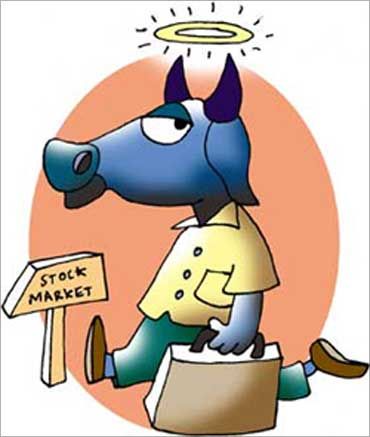
If you simply understand that you do not understand the stock market, that will be a favour. A big favour, says P Subramanyam
The equity markets are simple to understand except when you try to use too much intelligence. The markets (internationally) is driven by various factors -- macro and micro.
The three important factors that one speaks of while talking market valuation are fundamental, technical, and market sentiment.
Remember understanding equity markets is very complicated if you wish to really do a scholarly kind of a study. Let us say you wish to understand the price movement of one company Tata Power. For this you need to understand what drives energy demand, whether the total power is sold in the free market, coal pricing internationally, competitors, price of competing fuel, etc.
Even after all this you could get the price movement of Tata Power wrong. Completely wrong because in one project in Mundhra they are trapped because of a pig headed government. It is so very difficult to predict the movement of the index (and unnecessary too).
Let us see the 3 factors -- fundamentals, technicals, and market sentiments.
Fundamentals
Basically what drive prices in any market is demand and supply. So if the supply side is less and the demand is more, prices go up. This is what happened in 2003-2007.
A new animal called the FII came into the market and started buying. Increasing demand for shares drove prices up.
However when we talk of fundamentals we talk of : a) Earnings per share and (EPS) b) Price Earning (PE) ratio. a*b is the price stock price of that company.
Taking a running example, earnings per share is like practice: you need to keep doing it day in and day out. So companies keep working through out the year and arrive at the earning per share.
PE is like motivation: when you work hard, motivation goes up!! So companies which do well get a higher PE. This is a self-fulfilling prophesy!!
I have written just 2 lines about EPS and PE -- and you could actually do a PhD in each of the topics. Some valuation experts say that cash earned by a company per share is a better measure, and PE is also impacted by sentiment, etc.
In the context of this article, we will stick to these 2 lines only.
Technical factors
The technical factors are inflation, money supply / liquidity in the country and globally, government policy (will the RBI lend money against capital market assets or not), the willingness of people to be in this asset class (Indians predominantly prefer government guaranteed debt), economic strength of the markets, price expectations of other competitive products like precious metals, oil, currencies, demographics, trends, market penetration for equity products, etc.
Market sentiments
this is the collective feeling of all individuals -- the professional managers dealing with pension funds, insurance funds, ETF, etc. This is a very important factor but we are not in too much of a position to talk about this factor. We are just starting to understand this.
For example when there was news starting to trickle that Narendra Modi will become Prime Minister, the market started going up. Obviously, the market does not go up from the day of the swearing in ceremony!! I got into PSU shares like BHEL, NTPC, and EXITED when NaMo actually came in.
At that stage the speculators need to leave, so they sell increasing the supply pf shares and this pushes prices down. When we talk sentiment we talk about world sentiment -- Japan, US, EU, Oil prices, war by ISIS, etc.
However see what happens when one day the market goes down by 400, 500 or 800 points! Some idiot says 'Today Greece went down by 11 per cent but India went up 900 points', or 'Japan cut interest rates, Indian markets still went down' or 'RBI cut rates by just 0.25 per cent and therefore markets crashed'.










 © 2025 Rediff.com -
© 2025 Rediff.com -